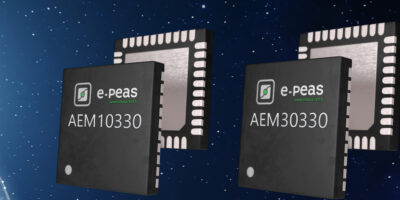PMICs use low battery voltages for energy harvesting from solar, RF and vibration
Two devices have been added to e-peas’ portfolio of advanced power management ICs (PMICs) for energy harvesting applications. The AEM10330 and AEM30330 PMICs have a buck-boost architecture and are designed for lower battery voltages than other solutions on the market, says e-peas.
The ICs can supervise high-speed charging of super capacitors to allow more energy to be made available to the load. The AEM10330 is specifically intended for solar deployments, while the AEM30330 is targeted at RF/vibration-oriented deployments, (including industrial, home automation, asset tracking and aftermarket automotive monitoring systems, as well as retail applications.
Both the AEM10330 and AEM30330 have a low cold-start threshold at which they can begin to draw energy from the surrounding environment. This is now just 275mV/3.0 microW. This is claimed to be unmatched by any device currently available.
The PMICs can deliver up to 60mA, to rapidly charge storage elements. By leveraging the fully configurable maximum power point tracking (MPPT) function, the AEM10330 and AEM30330 can continuously monitor and regulate the input with a fast refresh rate of 20 milliseconds supported. The extraction efficiency of the system will be kept as high as possible, regardless of variations in the input from the source, says e-peas.
Adaptive energy management permits these devices to automatically switch between boost, buck-boost and buck operational configurations as appropriate. This ensures that optimal energy transfer is always maintained between the respective inputs and outputs. This single power converter can automatically select between three inputs (the harvester, the storage device or a primary battery) and two outputs (the storage device or the application load). The PMICs are believed to be the only devices available that can directly transfer harvested energy to the load or to the storage element.
The PMICs have a working temperature range of -40 to +125 degrees C. They are supplied in compact 40-pin QFN packages and require only four additional components, which not only reduces the bill of materials but also means the PMIC occupy very little board space.




